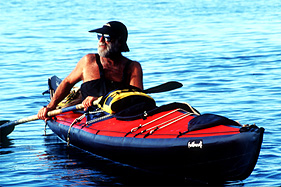
By Richard Roshon, Lecturer, Author, Kayak Entrepreneur Established 1975
Our World's Oceans - Out of sight - Out of mind
|
The world is a sort of living being, with a predetermined age. We are the children of this great mother earth. We suckle her breast to partake of the food she produces. She also nurtures us through the circulating currents of oxygen, the sunshine, and the water of her atmosphere. Just as we go through youth, middle age, old age, death, and reincarnation, so also does the mother earth. There is the young mother earth, the middle-aged mother earth, and the old-aged mother earth. The earth "dies" through partial dissolution, then reincarnates again to give human beings new life, new strength, a new habitat in which to work out their karma.
Paramahansa Yogananda
In 1947
Thor Heyerdal and crew sailed from Peru to the island of Raroia in the
Tuamotu Islands in a Balsa Raft. Covering 4,300 miles in 101 days he writes,
"On this ocean, where I encountered few signs of life, the traces
of my fellow man were none-the-less very much in evidence. Pollution was
visible everywhere. Plastic bags, Styrofoam, packing etc. We seem to believe
the ocean is endless, but we use it like a sewer".
In
1991 Gerald D/Aboville rowed across the Pacific Ocean from Japan to Washington
State. He writes, "Every twenty minutes or so I would come upon some
sort of debris, which, considering my limited horizon, suggests the magnitude
of the problem.
In
1989 I crewed on a sailboat from the Philippines north along the coast
of Japan. Several hundred miles from anywhere we sailed through miles
of driftnets. It was estimated that over 40,000 miles of drift net were
being laid each and every day in the North Pacific, enough net to stretch
from San Francisco to Tokyo 6-8 times.
On
another voyage in 1993 from Maui to Seattle, 1000 miles from the West
Coast we sailed for three hours through nothing but plastic.
Over
30 years of circumnavigating the Hawaiian Islands by Ocean Kayak man has
left his footprints everywhere.
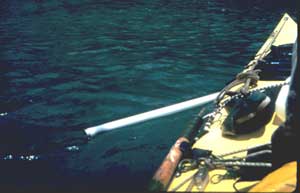 |
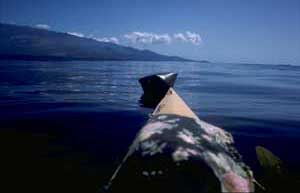 |
Off-shore waters of Maui, Hawaii |
|
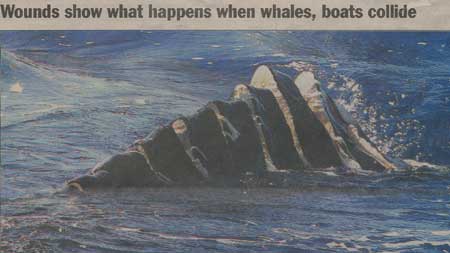 I
often wonder what a migrating species such as the North Pacific Humpback
whale encounters on their long open ocean migrations. From noise pollution,
drift nets to lots of shipping. The oceans are the world's largest echo
chamber, where sound travels 5 times further than in our atmosphere. In
1999 it was estimated that over 700 ships depart and enter Tokyo Wan each
and every day.
I
often wonder what a migrating species such as the North Pacific Humpback
whale encounters on their long open ocean migrations. From noise pollution,
drift nets to lots of shipping. The oceans are the world's largest echo
chamber, where sound travels 5 times further than in our atmosphere. In
1999 it was estimated that over 700 ships depart and enter Tokyo Wan each
and every day.The North Pacific Humpback whale migrates annually from the Bering Sea & Alaskan waters to the Hawaiian Archipelago to mate and give birth. Engine noise blocks their most important sense of sound. This particular calf wasn't fast enough to get out of the way.
A newborn calf hit by fast moving boat, Lahaina Maui 2005.
Something to think about:
The Southern Albatross and the Polar Bear are two species that probably live farther away from human beings that any other species. However they too are found with toxins within their systems.
The Northern Right Whale population in the North Atlantic is not doing well. They are reported to look healthy and feeding, however they are not reproducing. It is believed that the food they are eating is contaminated. Stands to reason, as the Northern Hemisphere is the industrial portion of the world, lots of run off.
The world's oceans may rise up to 4 ft. 7 in. by 2100 due to global warming, a faster than expected increase that could threaten low-lying coasts from Florida to Bangladesh. Reuters news service
The world's oceans may very well be depleted entirely by the year 2048. Reuters news service
Using several models that project habitat changes, migration capabilities of various species, and related extinctions in 25 "hotspots," scientists predict that a quarter of the world's plant and vertebrate animal species would face extinction by 2050.
LiveScience.com
What a sad world this would be without the singing of a bird, or the blow of the whale. Richard Roshon
Our oceans need more than just protection it needs direct human help. All too many species survive by our consent alone. For better or worse we have become the keepers of this planet, and our world's oceans.
Richard Roshon
www.hawaiiwhalesrus.com
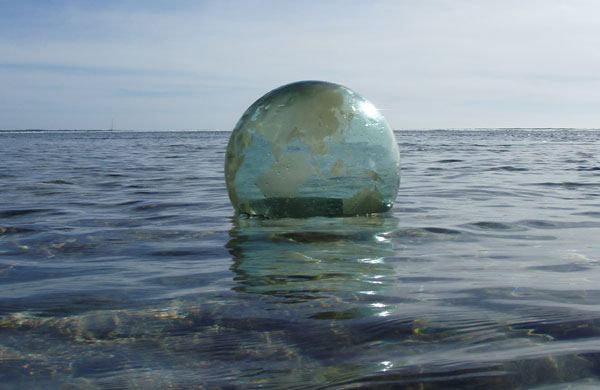
 This Site hosted by
This Site hosted by